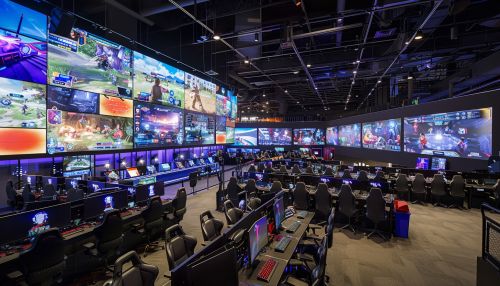Esports
Overview
Esports, also known as electronic sports, refers to the world of competitive, organized video gaming. Competitors from different leagues or teams face off in the same games that are popular with at-home gamers: Fortnite, League of Legends, Counter-Strike, Call of Duty, Overwatch and Madden NFL, to name a few. These gamers are watched and followed by millions of fans all over the world, who attend live events or tune in on TV or online. Streaming services like Twitch allow viewers to watch as their favorite gamers play in real time, and this is typically where popular gamers build up their fandoms.
History
The history of esports dates back to the 1970s and 1980s where the first video game competitions took place. The earliest known video game competition occurred on 19 October 1972 at Stanford University for the game Spacewar!. In the 1980s, the recognition of esports as a sport was not yet prevalent. The 1980s began to see the rise of the first popular arcade games like Space Invaders and Pac-Man, and with it, the rise of the first professional gamers. The first significant leap towards modern esports happened in the 1990s with the rise of the internet. The internet allowed gamers from all over the world to play against each other in real time. This was a major step in the development of esports as it allowed for competitive gaming to be done on a much larger scale than ever before.


Growth and Popularity
The growth of esports has been fueled by technological advances, with the creation of online streaming platforms being a key driver. Platforms like Twitch have given rise to the 'Let's Play' culture, where gamers can watch other gamers play in real time. This has created a community around esports that has been key to its growth. The popularity of esports has also been helped by the fact that traditional sports leagues and teams have begun to invest in esports. For example, the NBA, NFL, and NHL all have esports leagues. This has helped to legitimize esports and has brought it into the mainstream.
Esports Leagues and Tournaments
There are many esports leagues and tournaments throughout the world. Some of the most well-known include the League of Legends World Championship, the International Dota 2 Championship, the Evolution Championship Series, and the Intel Extreme Masters. These tournaments provide a platform for the best gamers in the world to showcase their skills. They also provide a way for gamers to earn a living, with some tournaments offering prize money in the millions of dollars.
Esports as a Career
With the growth of esports, there has been a rise in the number of people pursuing esports as a career. This includes not only professional gamers but also roles like coaches, managers, and broadcasters. The career path in esports is not yet as well-defined as in traditional sports. However, with the industry growing rapidly, there are more opportunities than ever for people to build a career in esports.
Future of Esports
The future of esports looks bright, with the industry expected to continue its rapid growth. There are several factors that are expected to drive this growth. These include the continued development of online streaming platforms, increased investment from traditional sports leagues and teams, and the potential inclusion of esports in the Olympic Games.
